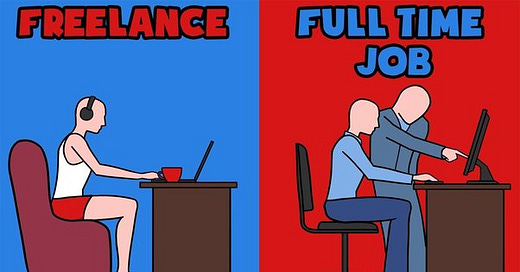TCW #044 | 7 situations where you should take a contractor role
Seven times when contract roles make more sense than FTE.
Hey, it’s 📣 Coach Erika! Welcome to a 🙏 paid subscriber edition🙏 of The Career Whispers. Each week I tackle reader questions about tech careers: how to get one, how to navigate them, and how to grow and thrive in your role.
Here’s a list of my top 5 paid subscriber posts of all time:
TCW #001: The Minimum Viable Interview Prep part 1 of 4: Crafting a Strategic, Compelling Career Story 📚🎤
TCW #011: Debugging your resume 🔎 🐜
TCW #028: A guide to tech job searching in a soft talent market (2023-2024) 👩🏻💻👨🏾💻
TCW #033: How to spot green flags and red flags in job postings ❌ ✅
TCW #016: How to Throw Green Flags, not Red Flags (in Job Interviews)🚦
Subscribe to The Career Whispers to access these posts and every future post.
It’s a common mental model in Silicon Valley that being an FTE (full-timer) is better than being a contractor, but I’ve met many people who relish the (often surprising) benefits and freedoms that come with being a contractor.
There are at least 7 situations where being a contractor makes more sense than taking a full-time role.
If you’re job searching now or in the future, it’s worth considering contractor roles if one of these seven situations applies to you…
Let’s dive in.
1/ You need employment, fast
Contract roles might make more sense when you have a tight timeline to find a job, especially when you have health benefits from another source.
FTEs also have more workplace protections and legal rights, so making a hiring mistake can be financially and otherwise painful for employers. FTE roles thus involve more vetting and interviews, because full-time employees are seen as a longer-term investment. I’ve seen interview processes for full-time roles take as long as six to eight months end to end, involving dozens of conversations, 5+ interviews, internal process delays, and eventually an offer.
Contractors, by contrast, have fewer legal protections, and thus also go through a less extensive vetting process. Most contract roles involve less than a month of interviews and internal approval processes, so you can get an offer faster and be in the role with a paycheck rolling in much faster. Just make sure you have health insurance.
2/ You're a digital nomad and/or relentlessly focused on work-life balance
Contractor roles might make more sense when you want to clock in, do the job, and leave work at work.
Full-time employees are exempt from overtime pay for a reason: they are hired to get the job done, not hired to work on a time clock. If getting the job done means a 5am launch war room, FTEs are expected to be there. If this means 3 days a week in the office, FTEs are expected to be there. Midnight meeting with global teams? On-call rotation? P0 production bug? Code Red? FTEs probably need to be there.
Contractors are subject to different rules. They usually are not exempt from overtime, for one. Contractors have a specific scope of work and tasks, and in the US they are legally protected from being treated the same as full-time employees. Hence, many contractors cite more predictability in their work hours and fewer times getting pulled into “fires.”
Side note: I’ve definitely seen full-timers who set strong boundaries and don’t show up for the midnight post-mortem meeting, but it’s more of an exception in today’s tech work culture than the rule. Times may change, but this is what I see today.
3/ You're trying to pivot (role/industry/domain) and need more exposure
Contractor roles might make more sense when you want to explore new roles, skill sets, industries, or domains but are having a hard time convincing employers to offer you a full-time role without the expertise (yet)
Many hiring managers and employers are willing to take risks on high-potential candidates who don’t yet have expertise — in that they are willing to hire them as contractors and potentially convert them into full-time employees once a role/budget opens up and if the contractor has proven their effectiveness.
I’ve hired dozens of contractors over many years and across multiple companies, and most often I hired the higher potential candidate that I felt would do the best work, even if they didn’t yet have an ironclad skill set in that area.
4/ You’re pursuing side hustles but need steady income
Contractor roles might make more sense when you want to save time and energy for exploring other tasks, hobbies, businesses, or side hustles.
Contract work can provide a steady income stream while allowing you to dedicate time and energy to other interests. This flexibility enables you to explore new opportunities and potentially establish a successful side hustle alongside your contract role.
Full-time roles often require disclosures for any work you’re doing on the side, and you have to be very careful about using company resources (like your work computer) to do any tasks for your side project, or you can quickly get into muddy waters regarding IP ownership.
Note that not all companies are litigious about side hustles, and I know many people (including myself!) who work full-time while running side businesses. However, full-timers are always expected to put their full-time roles first.





